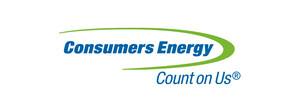Consumers Energy Offers 7 Tips to Help Homeowners Stay Safe and Warm This Heating Season
ROYAL OAK, Mich., Nov. 10, 2014 /PRNewswire/ -- With furnaces heating up as temperatures drop across the state, Consumers Energy is urging homeowners to combat the cold by keeping their heating systems properly maintained, and practicing simple safety tips that can help ensure continued warmth.
"We want homeowners and their families to stay both safe and warm throughout winter's cold grasp, and there are some inexpensive and easy steps that can help," said Mary Palkovich, vice president of energy delivery for Consumers Energy.
Palkovich recommended the following safety tips:
- Furnaces should be inspected once a year using a qualified appliance service/heating and cooling professional.
- Change air filters at least every other month (more often when pets are in the home) during the heating season.
- Weather permitting, perform a visual inspection of the chimney and vent pipes to make sure they are free of obstructions such as leaves and nests.
- Never use gas stoves or charcoal grills to heat homes. These appliances can produce dangerous amounts of carbon monoxide when used improperly.
- Never leave a supplemental heater or fireplace unattended. Keep clothing, papers and other flammable items well away from gas appliances and supplemental heaters.
- When using generators, make sure they are connected by a licensed electrician and only operated where there is adequate ventilation. Never use a generator in basement, enclosed garage, breezeway or near air intakes.
- Install an audible carbon monoxide alarm that will sound if dangerous levels of carbon monoxide are present in a home or building.
Taking these simple and inexpensive steps can help make sure furnaces, boilers, hot water and supplemental heaters operate properly and safely.
Carbon monoxide is often called the "silent killer" because it is a tasteless, odorless, invisible gas caused by the incomplete combustion of fuels like oil, propane, natural gas, coal, wood, kerosene, gasoline, diesel fuel and charcoal. Deadly amounts of carbon monoxide can be produced by defective or poorly vented appliances that use these fuels such as furnaces, fireplaces, wood stoves, supplemental heaters as well as generators and running vehicles.
Symptoms of carbon monoxide poisoning may include headaches, nausea, fatigue or dizziness. If you suspect carbon monoxide poisoning, move everyone to fresh air immediately and call 911 to have the home or building tested.
Consumers Energy, Michigan's largest utility, is the principal subsidiary of CMS Energy (NYSE: CMS), providing natural gas and electricity to 6.5 million of the state's 10 million residents in all 68 Lower Peninsula counties.
Media toolkit
LEARN MORE: For more information on ways to save energy, energy efficiency and assistance programs go to www.ConsumersEnergy.com/energyanswers
SUPPLEMENTAL HEATING: For safety information go to http://youtu.be/unKWGA6PpqE?list=PLmi8EGIdDXJgw6WdQeIT-Vl0zUC05U5yI
DOWNLOAD: This photo and others can be downloaded by going to www.flickr.com/photos/consumersenergy/sets/72157634342591265/
For more information about Consumers Energy, go to www.ConsumersEnergy.com, join us on Facebook at www.facebook.com/ConsumersEnergyMichigan and follow us on Twitter www.twitter.com/ConsumersEnergy.
SOURCE Consumers Energy
Related Links
http://www.consumersenergy.com
WANT YOUR COMPANY'S NEWS FEATURED ON PRNEWSWIRE.COM?
Newsrooms &
Influencers
Digital Media
Outlets
Journalists
Opted In





Share this article